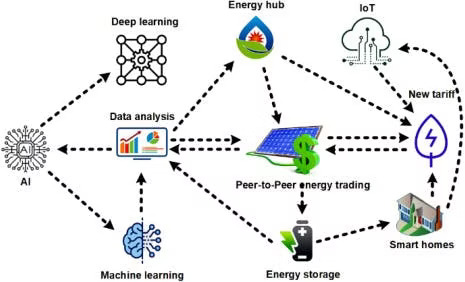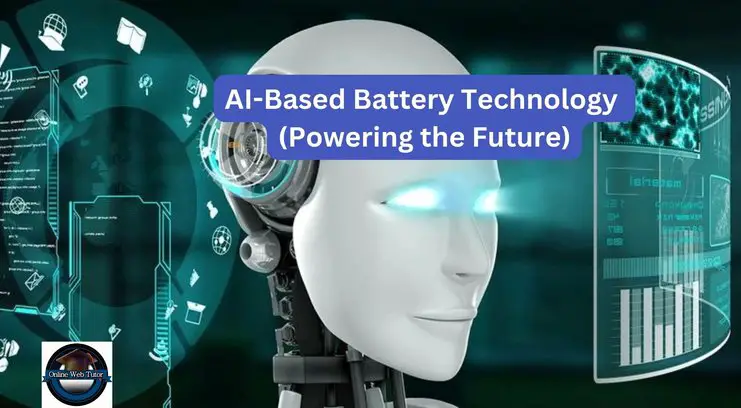As the world shifts towards renewable energy and electric vehicles, the demand for efficient, long-lasting batteries is greater than ever. Enter AI-based battery technology, a groundbreaking innovation poised to revolutionize the way we store and use energy.
This article explores the rise of AI-based battery technology, its benefits, challenges, and its potential impact on various industries.
Let’s get started.
Understanding AI-Based Battery Technology
What is AI-Based Battery Technology?
AI-based battery technology involves the integration of artificial intelligence (AI) into the design, management, and optimization of batteries. AI algorithms analyze vast amounts of data to improve battery performance, predict failures, and enhance energy efficiency.
This technology is applicable across various types of batteries, including lithium-ion, solid-state, and beyond.
How Does AI Enhance Battery Technology?
AI enhances battery technology by providing advanced predictive analytics and real-time monitoring. Machine learning algorithms can predict battery life cycles, optimize charging and discharging processes, and detect anomalies that could indicate potential failures.
This proactive approach ensures better performance and longevity of batteries.

A battery energy storage system. (Source: Siemens)
Benefits of AI-Based Battery Technology
Improved Battery Life and Performance
One of the most significant advantages of AI-based battery technology is the improvement in battery life and performance. By continuously monitoring and analyzing battery health, AI can adjust charging patterns and manage power consumption more effectively, resulting in longer-lasting batteries.
Enhanced Safety
Safety is a critical concern with battery technology, especially in applications like electric vehicles and portable electronics. AI can detect early signs of battery degradation or overheating, allowing for preventive measures to be taken before any safety issues arise. This reduces the risk of battery fires and other hazards.
Greater Energy Efficiency
AI algorithms can optimize the way batteries are charged and discharged, leading to greater energy efficiency. This is particularly important for renewable energy systems, where efficient energy storage is crucial for maximizing the use of solar and wind power.
Cost Savings
By extending battery life and improving efficiency, AI-based technology can lead to significant cost savings. Consumers and businesses alike can benefit from reduced maintenance costs and fewer replacements, making this technology economically advantageous in the long run.
Challenges of AI-Based Battery Technology
Data Privacy and Security
The integration of AI in battery technology raises concerns about data privacy and security. The continuous monitoring of battery performance generates a vast amount of data that needs to be protected from cyber threats. Ensuring robust data security measures is essential to address these concerns.
Technological Complexity
Implementing AI-based solutions in battery technology can be complex and requires significant expertise. Developing and maintaining the necessary algorithms and systems can be challenging, particularly for smaller companies or startups without extensive resources.
Initial Costs
The initial cost of integrating AI into battery systems can be high. While the long-term benefits and cost savings are substantial, the upfront investment may be a barrier for some organizations.
Over time, as the technology becomes more widespread and affordable, this challenge is likely to diminish.

(Source: ScienceDirect)
Applications of AI-Based Battery Technology
Electric Vehicles
Electric vehicles (EVs) are at the forefront of adopting AI-based battery technology. AI helps in managing battery health, optimizing charging cycles, and enhancing overall vehicle performance.
This leads to longer driving ranges and reduced charging times, making EVs more practical and appealing to consumers.
Renewable Energy Storage
In renewable energy systems, efficient storage is crucial for balancing supply and demand. AI can optimize the storage and release of energy from batteries, ensuring maximum utilization of solar and wind power. This makes renewable energy systems more reliable and cost-effective.
Consumer Electronics
AI-based battery technology is also making its way into consumer electronics, such as smartphones, laptops, and wearable devices. By improving battery management, AI ensures longer battery life and better performance, enhancing the user experience.
Industrial Applications
Industries that rely on battery-powered equipment, such as logistics and manufacturing, can benefit from AI-based battery technology. Improved battery performance and longevity lead to increased operational efficiency and reduced downtime, driving productivity and profitability.
FAQs (Frequently Asked Questions): AI-Based Battery Technology
>> What is AI-based battery technology?
AI-based battery technology involves using artificial intelligence to design, manage, and optimize batteries. AI algorithms analyze data to improve battery performance, predict failures, and enhance energy efficiency.
>> How does AI improve battery performance?
AI improves battery performance by providing predictive analytics and real-time monitoring. It optimizes charging and discharging processes, detects anomalies, and adjusts patterns to ensure better performance and longer battery life.
>> What are the benefits of AI-based battery technology?
Benefits include improved battery life and performance, enhanced safety, greater energy efficiency, and cost savings. AI helps in extending battery lifespan, reducing risks of failures, optimizing energy use, and cutting maintenance costs.
>> What challenges does AI-based battery technology face?
Challenges include data privacy and security concerns, technological complexity, and high initial costs. Ensuring robust data protection and managing the complexity of AI integration are key hurdles to overcome.
>> Where is AI-based battery technology used?
AI-based battery technology is used in electric vehicles, renewable energy storage systems, consumer electronics, and industrial applications. It helps optimize battery performance and efficiency across these sectors, driving innovation and sustainability.
Conclusion
AI-based battery technology is set to transform the way we store and use energy. With benefits ranging from improved battery life and performance to enhanced safety and cost savings, this technology holds immense potential across various sectors.
While challenges such as data privacy and initial costs need to be addressed, the long-term advantages make AI-based battery technology a promising solution for a sustainable future.
Read more